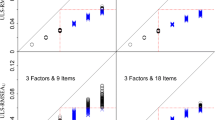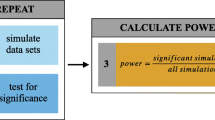Abstract
Ordinal Optimization has emerged as an efficient technique for simulation and optimization. Exponential convergence rates can be achieved in many cases. In this paper, we present a new approach that can further enhance the efficiency of ordinal optimization. Our approach determines a highly efficient number of simulation replications or samples and significantly reduces the total simulation cost. We also compare several different allocation procedures, including a popular two-stage procedure in simulation literature. Numerical testing shows that our approach is much more efficient than all compared methods. The results further indicate that our approach can obtain a speedup factor of higher than 20 above and beyond the speedup achieved by the use of ordinal optimization for a 210-design example.
Similar content being viewed by others
References
Banks, J. 1998. Handbook of Simulation. John Wiley.
Bechhofer R. E., Santner, T. J., and Goldsman, D. M. 1995. Design and Analysis of Experiments for Statistical Selection, Screening, and Multiple Comparisons. John Wiley & Sons, Inc.
Bernardo, J. M., and Smith, A. F. M. 1994. Bayesian Theory. Wiley.
Bratley, P., Fox, B. L., and Schrage, L. E. 1987. A Guide to Simulation, 2nd ed. Springer-Verlag.
Cassandras, C. G., Dai, L., and Panayiotou, C. G. 1998. Ordinal optimization for deterministic and stochastic discrete resource allocation. IEEE Trans. on Automatic Control 43(7): 881–900.
Chen, C. H. 1995. An effective approach to smartly allocate computing budget for discrete event simulation. Proceedings of the 34th IEEE Conference on Decision and Control, pp. 2598–2605.
Chen, C. H. 1996. A lower bound for the correct subset-selection probability and its application to discrete event system simulations. IEEE Transactions on Automatic Control 41(8): 1227–1231.
Chen, C. H., and Ho, Y. C. 1995. An approximation approach of the standard clock method for general discrete event simulation. IEEE Transactions on Control Systems Technology 3(3): 309–317.
Chen, H. C., Chen, C. H., Dai, L., and Yücesan, E. 1997. New development of optimal computing budget allocation for discrete event simulation. Proceedings of the 1997 Winter Simulation Conference, pp. 334–341.
Chen, C. H., Wu, S. D., and Dai, L. 1999. Ordinal comparison of heuristic algorithms using stochastic optimization. IEEE Transactions on Robotics and Automation 15(1): 44–56.
Chen, H. C., Chen, C. H., and Yücesan, E. 2000. Computing efforts allocation for ordinal optimization and discrete event simulation. To appear in IEEE Transactions on Automatic Control.
Chick, S. E. 1997. Bayesian analysis for simulation input and output. Proceedings of the 1997 Winter Simulation Conference, pp. 253–260.
Dai, L. 1996. Convergence properties of ordinal comparison in the simulation of discrete event dynamic systems. Journal of Optimization Theory and Applications 91(2): 363–388.
DeGroot, M. H. 1970. Optimal Statistical Decisions. McGraw-Hill, Inc.
Fabian, V. 1971. Stochastic Approximation, Optimization Methods in Statistics. J. S. Rustagi (ed.), Academic Press, New York.
Goldsman, G., and Nelson, B. L. 1994. Ranking, selection, and multiple comparison in computer simulation. Proceedings of the 1994 Winter Simulation Conference, pp. 192–199.
Gong, W. B., Ho, Y. C., and Zhai, W. 1999. Stochastic comparison algorithm for discrete optimization with estimation. SIAM Journal on Optimization.
Ho, Y. C., Sreenivas, R. S., and Vakili, P. 1992. Ordinal optimization of DEDS. Journal of Discrete Event Dynamic Systems 2(2): 61–88.
Inoue, K., and Chick, S. 1998. Comparison of Bayesian and Frequentist assessments of uncertainty for selecting the best system. Proceedings of the 1998 Winter Simulation Conference, pp. 727–734.
Kushner, H. J., and Clark, D. S. 1978. Stochastic Approximation for Constrained and Unconstrained Systems. Springer-Verlag.
Law, A. M., and Kelton, W. D. 1991. Simulation Modeling & Analysis. McGraw-Hill, Inc.
Patsis, N. T., Chen, C. H., and Larson, M. E. 1997. SIMD parallel discrete event dynamic system simulation. IEEE Transactions on Control Systems Technology 5(3): 30–41.
Rinott, Y. 1978. On two-stage selection procedures and related probability inequalities. Communications in Statistics A7: 799–811.
Walker, R. C. 1999. Introduction to Mathematical Programming. Prentice Hall.
Wilcox, R. R. 1984. A table for Rinott's selection procedure. Journal of Quality Technology 16(2): 97–100.
Yan, D., and Mukai, H. 1993. Optimization algorithm with probabilistic estimation. Journal of Optimization Theory and Applications 79: 345–371.
Author information
Authors and Affiliations
Rights and permissions
About this article
Cite this article
Chen, CH., Lin, J., Yücesan, E. et al. Simulation Budget Allocation for Further Enhancing the Efficiency of Ordinal Optimization. Discrete Event Dynamic Systems 10, 251–270 (2000). https://doi.org/10.1023/A:1008349927281
Issue Date:
DOI: https://doi.org/10.1023/A:1008349927281




